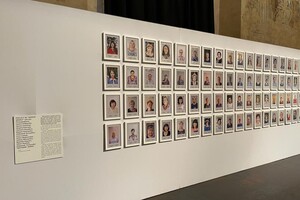The project became part of the exposition dedicated to the struggle of Ukraine for its freedom.

The 59th Venice Biennale opens this week – one from the most prestigious exhibitions of contemporary art in the world. As part of the official parallel program of the event, the exposition “This is Ukraine: Defending Freedom” will be presented, part of which was the ZN.UA project “Moms” , released in 2019.
Read also : London National Gallery renamed Degas' Russian Dancers
“Mothers” is a 321 portrait of mothers of soldiers who died in Luhansk and Donetsk regions in 2014-2015, created by Ukrainian photographers. The project reminds of when Russia actually started the war in our country, and is also a tribute to those who gave the most important things.
Regular readers of ZN.UA remember this project, as its representatives also remember it. all the branches of Ukrainian power to which we sent portraits of the mothers of the fallen defenders of Ukraine, so that looking them in the eye, they understand what kind of country to build.
We are proud to be able to convey to the international cultural community the tragedy expressed not in faceless statistics, but in the faces of mothers from whom the war has taken away the most precious, most importantly, meaning of life – their sons.
For the first time since the Russian invasion, Israel will supply bulletproof vests and helmets to Ukraine – media Israel is currently studying the technical side of the issue – ways to deliver protective kits and the mechanism for their transfer to destination. War Assistance: A New Handbook of Useful Contacts Humanitarian, Psychological and Other Assistance. In Ukraine, migrants will be allowed to buy temporary housing on the terms of long-term soft loans. In Popasna, our fighters destroyed an enemy detachment of Libyans and Syrians – Danilov The Ukrainian army conducted a successful operation to eliminate foreign mercenaries in Luhansk region. In the temporarily occupied territory of Kherson region, the occupiers want to hold a “pseudo-referendum”, and after – a “census” The occupiers prohibit any movement of local residents.


